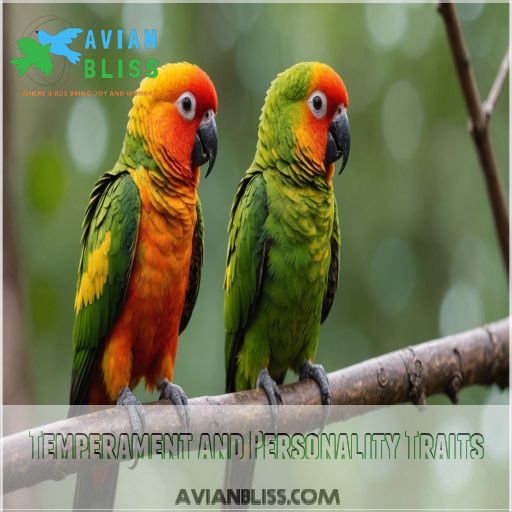This site is supported by our readers. We may earn a commission, at no cost to you, if you purchase through links.

While they share similarities in their playful personalities, there are some key differences you can’t ignore.
Jendays have a striking red-orange body with green wings, while suns flaunt golden-yellow plumage and orange facial patches.
Jendays are slightly smaller and calmer than the attention-seeking sun conures.
Both species are known for their loud vocalizations, but suns have a more piercing call.
Whether you’re drawn to the bold jenday or the charismatic sun, these feathered friends make wonderful companions – if you’re ready for their big personalities and vocal antics!
Table Of Contents
- Key Takeaways
- Jenday Conure Vs Sun Conure: Distinguishing Features
- Origin and Natural Habitat Differences
- Temperament and Personality Traits
- Vocalization Patterns and Noise Levels
- Care Requirements and Housing Needs
- Health Concerns and Common Medical Issues
- Breeding Behaviors and Reproduction
- Cost Comparison and Availability
- Legal Considerations and Ownership Restrictions
- Suitability as Pets for Different Lifestyles
- Frequently Asked Questions (FAQs)
- Which is louder Jenday or sun conure?
- Is a Jenday conure the same as a sun conure?
- Which is the friendliest conure?
- What is the personality of a Jenday conure?
- How do Jenday and Sun conures diets differ?
- Are Jenday and Sun conures easy to train?
- Do Jenday and Sun conures enjoy music?
- What toys do Jenday and Sun conures prefer?
- Can Jenday and Sun conures recognize their names?
- Conclusion
Key Takeaways
- You’ll be dazzled by the striking differences in plumage between jenday and sun conures – jendays sport a vibrant red-orange body while suns flaunt golden-yellow feathers.
- While both species are known for their loud vocalizations, sun conures have a more piercing call that might ruffle your feathers. But don’t worry, with some training and enrichment, you can manage the noise levels.
- Jenday conures are slightly calmer and more trainable than the attention-seeking sun conures, so choose the one that best fits your lifestyle and personality.
- Whether you go for the bold jenday or the charismatic sun, these feathered friends make wonderful companions – if you’re ready to embrace their big personalities and vocal antics!
Jenday Conure Vs Sun Conure: Distinguishing Features
You might think Jenday and Sun conures are two peas in a pod, but prepare to have your mind blown by their surprising differences.
From their vibrant plumage to their subtle size variations, these feathered friends have some eye-opening distinctions that’ll make you do a double-take.
Physical Appearance and Coloration
You’ll often spot the striking difference between jenday and sun conures at first glance.
Jendays sport a vibrant red-orange body with green wings, while sun conures dazzle with their golden-yellow plumage and orange facial patches.
Both have blue tail feathers.
Size and Weight Comparisons
How do these colorful conures measure up? Let’s compare their sizes:
- Jenday conures: typically 10-12 inches long
- Sun conures: usually 11-13 inches long
Both species are compact powerhouses of personality!
- Jenday weight: around 110-130 grams
- Sun conure weight: approximately 120-140 grams
Beak and Feather Characteristics
Despite their similarities, jenday and sun conures sport distinct beak and feather characteristics.
Take a gander at these eye-catching differences:
| Feature | Jenday Conure | Sun Conure | Wow Factor |
|---|---|---|---|
| Beak Color | Black | Horn-colored | Striking! |
| Head Hue | Yellow | Golden-orange | Dazzling! |
| Wing Accent | Green | Yellow-green | Mesmerizing! |
| Tail Tip | Blue | Olive-green | Amazing! |
Sexual Dimorphism in Both Species
One might think Jenday and Sun conures are identical twins, but their subtle differences tell a different story. These species exhibit minimal sexual dimorphism, making it tricky to determine their sex visually.
- Eye-ring color varies between males and females
- Iris shades differ slightly between sexes
- Beak shape can be a subtle indicator
- Feather patterns may show slight variations
Origin and Natural Habitat Differences
You’ve seen their stunning colors, but did you know these feathered friends come from different corners of the world? Let’s explore the wild roots of jenday and sun conures!
Jenday conures, also known as Jandaya parakeets, hail from northeastern Brazil. They’re right at home in dense woodlands and palm groves, where they feast on fruits, seeds, and nuts. These social butterflies form flocks of up to 30 birds, making quite a spectacle in the treetops!
On the flip side, sun conures originate from a wider range, spanning northeastern South America. You’ll find them in Venezuela, Guyana, and parts of Brazil. They prefer open, savanna-like areas and coastal forests, adapting well to varying climates.
Both species face threats from habitat loss and illegal pet trade. While they share similar food preferences, their unique habitats have shaped their behaviors and adaptations. Understanding these differences helps us appreciate the rich diversity of our colorful conure companions!
Temperament and Personality Traits
You might think all conures are alike, but jenday and sun conures have some surprising personality differences.
Let’s explore how these colorful birds stack up when it comes to their social behavior, affectionate tendencies, energy levels, and trainability, considering how bird color variations play a role in their evolution.
Social Behavior and Interaction With Humans
With both Jenday and Sun conures, you’re in for a social whirlwind! These feathered friends crave human interaction like a fish needs water, often showing affection through preening.
Here’s what to expect:
- Playful acrobatics that’ll have you in stitches
- Curious beak explorations of your belongings
- Melodious (or not-so-melodious) serenades
- Shoulder-perching shenanigans
- Attention-seeking antics when you’re busy
Affectionate Tendencies and Bonding Patterns
Both jenday and sun conures are affection magnets, but they’ve got their quirks. Let’s compare their cuddly tendencies:
| Trait | Jenday Conure | Sun Conure |
|---|---|---|
| Bonding | One-person focused | Whole-family friendly |
| Cuddle Style | Head scratches | Full-body snuggles |
| Jealousy Level | Mild | Can be intense |
| Socialization Needs | Moderate | High |
Playfulness and Energy Levels
After cuddling, observe their playfulness. Both jenday and sun conures have high energy levels!
Jenday conures might be slightly calmer, but they still need plenty of out-of-cage time, chew toys, and wood toys to satisfy their exercise requirements.
Trainability and Intelligence Comparison
You’ll be delighted to discover that Jenday conures are quick learners, easily mastering tricks and commands with their impressive problem-solving skills.
They’re highly food-motivated, making training a breeze compared to their Sun conure cousins.
Vocalization Patterns and Noise Levels
When you’re considering a pet conure, knowing their vocal habits can be a real ear-opener!
Both Jenday and Sun conures are known for their loud calls, but Jendays are slightly less piercing, which might save you a few headaches.
Frequency and Volume of Calls
Jenday and Sun conures are known for their vocal prowess, ensuring you’ll never need an alarm. But when stress levels rise or play stands disappear, they might ruffle feathers with their calls. Keep these noise-inducing factors in mind:
- Time of Day
- Age
- Training Methods
- Environmental Factors
- Conure Diet
Speech Mimicry Abilities
Jenday and Sun conures aren’t well-known for mimicry like the blue-crowned conure.
While they might pick up common phrases, they rely more on expressive calls.
Speech training tips include positive reinforcement and patience, but don’t expect stand-up comedy like clicker training.
Triggers for Loud Vocalizations
Boredom, loneliness, and lack of attention can trigger loud squawks from your conure.
They may also vocalize when scared or hungry.
Understanding these triggers helps you manage their noise levels effectively.
Techniques for Managing Noise
Got squawky conures driving you up the wall? Here are your secret weapons:
- Soundproofing rooms can help.
- Training sessions can be scheduled for quiet time.
- Offer Enrichment to distract them.
- Control Timing of cage cover.
- Choose a strategic Location.
Care Requirements and Housing Needs
Jenday and Sun conures are high-maintenance housemates with their distinct care requirements, demanding space as big as their quirky personalities.
While both species thrive on a diet richer in fruits and veggies than a rabbit’s dream menu, they’d never refuse an apple a day—just keep the vet away!
Cage Size and Setup Recommendations
Virtually every bird expert will tell you, a spacious cage keeps a conure happy! Keep an eye on these essentials:
| Setup Element | Recommendation |
|---|---|
| Cage Placement | Avoid direct sunlight |
| Perch Types | Variety for foot health |
| Toy Selection | Switch weekly |
Cage setup is critical for a happy conure.
Dietary Requirements and Feeding Schedules
Jenday conures thrive on a balanced diet of pellets, supplemented with fresh fruits, veggies, and the occasional seed or nut treat.
Offer unlimited pellets and 1/8 to 1/4 cup of produce daily to meet their nutritional needs.
Exercise and Enrichment Activities
Alright, you’ve hit the jackpot on feeding tips! Now, let’s jump into exercise and enrichment.
Toy selection is key—make it varied and fun.
Include foraging enrichment and flight time with interactive games.
Keep things fresh for mental stimulation!
Grooming and Hygiene Practices
After your conure’s playtime, keep grooming simple.
Nail trimming prevents sharp talons, while regular bathing reduces feather plucking.
Don’t forget the beak care!
A healthy diet impacts overall hygiene, so offer crunchy foods to naturally manage beak length.
Health Concerns and Common Medical Issues
Dealing with health issues with jenday and sun conures can be like handling a feathery soap opera, with unique twists and genetic flair.
Each species has its own medical quirks, so regular vet check-ups can keep your bird squawking happily ever after.
Species-Specific Vulnerabilities
As a jenday conure parent, you’ll want to watch for common issues like feather plucking, beak malocclusion, and respiratory problems, and be able to identify molting vs plucking to ensure your feathered friend is healthy and happy.
These birds can be sensitive to environmental changes and nutritional imbalances.
Stay vigilant to keep your feathered friend happy and healthy!
Preventive Care and Regular Check-ups
Preventive care is key, like a feather in your cap.
Regular avian vet visits should include yearly checkups and parasite control.
Address common issues like feather plucking and follow diet recommendations to keep your conure chirpy.
| Care Aspect | Jenday Conure | Sun Conure |
|---|---|---|
| Vet Visits | Annual | Annual |
| Parasite Control | Recommended | Essential |
| Diet Adjustments | Guided | Customized |
Lifespan and Aging Considerations
Just like people need more care as they age, senior conures do too.
They typically live 20-30 years with good care.
You’ll notice age-related changes such as decreased energy.
Regular vet visits and dietary adjustments help manage health concerns.
Genetic Predispositions
Jenday and Sun conures are like feathered toddlers with the potential for mischief.
Breeding potential can lead to inherited health risks like feather plucking and disease susceptibility.
Lifespan variations—a balanced diet and regular vet visits help mitigate issues.
Breeding Behaviors and Reproduction
In terms of breeding, Jenday and Sun conures have some fascinating differences.
While both species engage in mating rituals and pair bonding, like a cloacal kiss, they each have unique personalities and care requirements,
their egg-laying patterns, incubation behaviors, and chick-rearing techniques can vary, making their reproductive journeys quite unique.
Mating Rituals and Pair Bonding
If you’re curious about conure romance, both Jenday and Sun conures have unique courting rituals and long-lasting pair bonds.
Imagine this love tale:
- Intricate courtship displays
- Collaborative nest selection
- Shared egg incubation
- Attentive parental care
These birds are truly committed partners!
Egg-Laying Patterns and Clutch Sizes
From mating rituals, we naturally explore egg-laying patterns.
Both Jenday and Sun Conures typically produce 3-4 eggs per clutch, like clockwork.
Egg frequency doesn’t vary much, but look out for viable eggs, else they’re just breakfast with feathers.
Incubation and Chick-Rearing Differences
While eggs hatch over similar periods, Jenday and Sun conures show some quirky parenting styles.
You might notice differences in nestling development, parental care, and how each species approaches hatchling feeding.
It’s like comparing different styles of helicopter parenting!
Hybridization Potential and Concerns
While Jenday and Sun conures can interbreed, their hybrid offspring pose genetic concerns.
To preserve species diversity, responsible owners should avoid breeding these conures.
Consider these 4 key factors:
- Limited gene pool
- Unpredictable traits
- Ethical implications
- Conservation impact
Cost Comparison and Availability
When deciding between Jenday and Sun Conures, your wallet might notice the slight price difference as Jendays tend to be cheaper by $50-$100.
However, the availability of these delightful birds can vary by location, adding an extra layer of excitement to your quest for the perfect avian companion.
Initial Purchase Price Ranges
Putting the cost under a magnifying glass reveals that Jenday conures are generally more wallet-friendly than Sun conures.
Let’s break it down with a neat little table:
| Conure Type | Average Cost | Adoption Fees |
|---|---|---|
| Jenday | $600 | Varies |
| Sun | $650-$700 | Varies |
Grab your calculator and happy shopping!
Ongoing Care Expenses
Owning a jenday or sun conure keeps you on your toes—and perhaps on a budget!
You’ll juggle veterinary costs, food costs, toy costs, cage costs, and grooming costs.
But like any worthy adventure, they’re sure to bring joy!
Adoption Options and Rescue Availability
Adopting a jenday conure? Check trusted rescue groups for available birds. Adoption fees vary, but you may find a perfect feathered friend waiting to join your family. Fostering is another great option to think about.
- Research rescue organization reputations
- Inquire about adoption fees and success stories
- Explore fostering opportunities in your area
Breeder Selection Criteria
While searching for your jenday or sun conure, remember: getting the right breeder is a goldmine!
| Criteria | Importance | Example Question |
|---|---|---|
| Breeding Experience | High | How long have you bred them? |
| Health Records | Critical | Do you have vet certifications? |
| Socialization Practices | Essential | How do you socialize chicks? |
It’s really important for a healthy, happy bird!
Breeding experience, health records, and socialization practices are all important factors to consider when choosing a breeder.
Legal Considerations and Ownership Restrictions
Owning a jenday or sun conure isn’t just about picking a bird; it’s like deciding whether to plant a garden or a forest, with every region having its own rules.
Before bringing home your feathery friend, check local laws and permits—it’s like making sure your parrot won’t need its own passport!
Import/Export Regulations
Pricing and availability are just part of the equation; international trade complicates things. Jenday and Sun conures face import restrictions due to their CITES status.
- Permits required.
- Legal implications abound.
- Understanding regulations makes for a smooth experience.
State and Local Ownership Laws
Figuring out the patchwork of state and local laws is key when owning a jenday conure.
Some areas may require permits or ban ownership entirely.
Research your region’s wildlife regulations to stay on the right side of the law.
Conservation Status and Protected Species Acts
Conservation laws aim to protect jenday and sun conures from illegal trade and habitat loss.
They’re endangered due to endemic threats and listed under CITES.
Protecting them helps make sure these colorful chatterboxes don’t vanish, leaving more than silence behind.
Licensing and Permit Requirements
- Jenday conure permits: Check local laws.
- CITES regulations: Necessary for international trade.
- State restrictions: Vary widely – research beforehand!
Suitability as Pets for Different Lifestyles
When you’re deciding between a jenday or sun conure for your home, it’s like choosing between a rock concert and a lively jazz performance—both are lively but offer different vibes.
You’ll want to match their needs for attention and space with your lifestyle, ensuring harmony in your household.
Apartment Living Compatibility
Jenday conures may not be the best choice for apartment living. Their loud, frequent vocalizations could disturb neighbors.
Make sure you have ample space for their active nature and flight needs.
Consider soundproofing options if opting for a jenday in close quarters.
| Noise Level | Cage Size | Space Needs |
|---|---|---|
| Loud | Large | Ample |
Family and Child-Friendly Aspects
Welcoming a parrot into your family can be like adding a new little chatterbox to the mix.
Bird-proof your home and teach kids to handle these feathered friends respectfully, easing aggression concerns.
Make sure child-safe toys and supervised interaction are available.
Time Commitment and Attention Needs
Thinking about a feathered friend means embracing daily interaction.
These vibrant companions crave training time, out-of-cage time, and bonding.
Neglect could turn playtime demands into a cacophony, echoing like an alarm clock—attention and love truly keep them chirping happily.
Compatibility With Other Pets
When you’re balancing a mix of furry and feathery friends, knowing which conure fits takes the cake. Both are:
- Dog-friendly: Beware of loud surprises.
- Cat-friendly: Keep bird-safe zones.
- Small-animal compatible: Supervision is key.
- Reptile-friendly: Maintain separate habitats.
Frequently Asked Questions (FAQs)
Which is louder Jenday or sun conure?
Imagine a symphony of nature’s alarms—Sun conures outshine with their shriller, piercing calls.
Jenday conures, though loud, are less ear-piercing.
If quietude isn’t your jam, Jendays dish out a slightly gentler cacophony.
Is a Jenday conure the same as a sun conure?
While Jenday and Sun conures share similarities, they’re different species.
Sun conures flaunt more yellow plumage, while Jenday conures are calmer.
Both are social and loud, making great companions if you enjoy vibrant personalities.
Which is the friendliest conure?
Both jenday and sun conures are known for their affectionate and playful personalities.
Sun conures are often described as the more cuddly and excitable of the two, making them the friendliest conure option.
What is the personality of a Jenday conure?
Did you know Jenday conures bond closely and enjoy cuddling?
They’re like feathered friends with a zest for life, needing daily social interaction to thrive.
Jendays are playful, forming strong bonds and love begging for affection.
How do Jenday and Sun conures diets differ?
You’ll find Jenday and Sun conures have similar diets, both thriving on fruits, vegetables, seeds, and pellets.
Sun Conures might be pickier eaters, so they might need a little nudge to explore.
Are Jenday and Sun conures easy to train?
Training Jenday and Sun conures can be like teaching a puppy tricks—they’re bright and enthusiastic, but patience and consistency are key.
Their intelligence and social nature mean with persistence, they’ll be loyal, amusing companions.
Do Jenday and Sun conures enjoy music?
Jenday and Sun conures can certainly groove to the beat!
These feathered friends perk up their heads and sway their bodies when exposed to lively tunes, showing off their natural rhythm and love for music, like a budgie bobbing its head https://avianbliss.com/budgie-bobs-head/.
What toys do Jenday and Sun conures prefer?
Conures thrive on toys that challenge and intrigue them, like puzzle toys, swings, and ladders.
Toss in some noisy bells or chewy ropes; it’ll keep their beaks and brains busy.
They’re the adrenaline junkies of the bird world!
Can Jenday and Sun conures recognize their names?
Think of it as their version of naming day: like many parrots, Jenday and Sun conures can learn to recognize their names over time, especially if you repeat their names consistently and positively associate it with rewards or attention.
Conclusion
Don’t worry about choosing just one! Both the jenday conure and sun conure offer unique charms.
Whether it’s the jenday’s quieter, gentle nature or the sun conure’s vibrant, extroverted personality, you’re in for a delightful experience.
These charming parrots demand attention, routine care, and ample companionship, but rewards include affection and companionship brimming with color and life.
Weigh their differences and see which conure matches your lifestyle, while embracing the adventure each offers. Happy conure-keeping!













